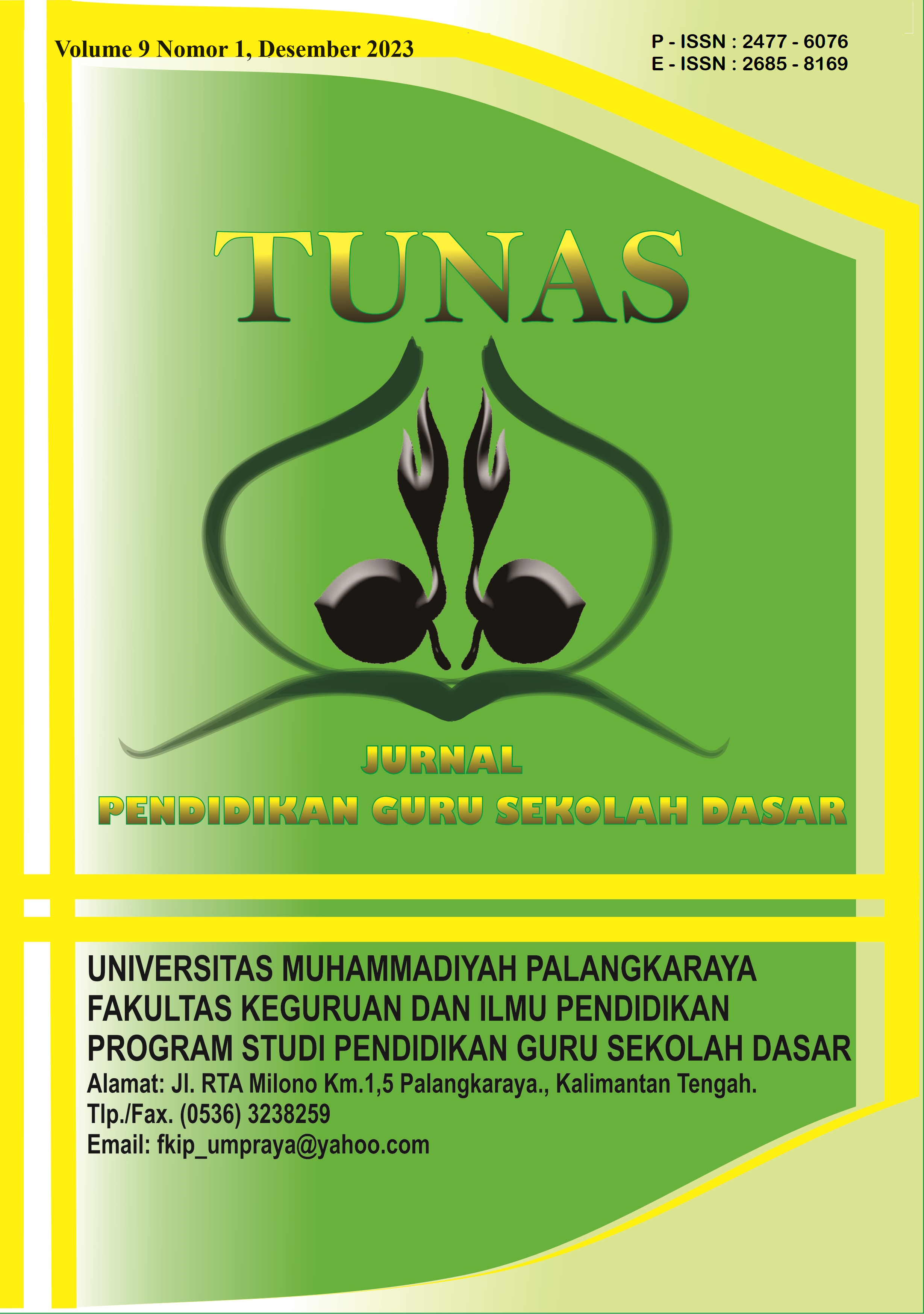School Rules Discipline: A Narrative Study on Elementary School Students in Martapura City
Main Article Content
Abstract
This study aims to describe how elementary school children exercise discipline in holding temporary desires and himmah in realizing desires. In describing it, researchers use the basic theory of Good (1959) and supporting theories from Hartati (2010) and Haidar (2013) which define discipline as self-control in an effort to resist momentary desires and the use of desires and abilities. Researchers use a qualitative approach with narrative design. Participants were taken from grade 5 elementary school students with the condition that they met the predetermined participant criteria. In taking data, researchers use interview techniques with reference to interview guidelines that have been made.The results showed that: (1) Elementary school age children are still at a concrete operational stage which leads to a rudimentary state of thought and emotional stability. Children are only able to think logically about abstract objects around them. External influences are very easy to enter the mind and change its movements. The usual influences received by elementary-age children such as skipping school, smoking, and the habit of staying up late. (2) Desire and ability are two things that are interrelated and influence. Desire is related to the goals to be achieved when the child grows up. While ability is related to the facilities available. A child's goals are influenced by two things: personal experience and external encouragement. Meanwhile, ability is influenced by school policies that encourage school literacy.
Downloads
Article Details

This work is licensed under a Creative Commons Attribution-ShareAlike 4.0 International License.
Authors who publish with this journal agree to the following terms:
- Any article on the copyright is retained by the author(s).
- The author grants the journal, right of first publication with the work simultaneously licensed under a Creative Commons Attribution License that allows others to share work with an acknowledgment of the work authors and initial publications in this journal.
- Authors are able to enter into separate, additional contractual arrangements for the non-exclusive distribution of published articles of work (eg, post-institutional repository) or publish it in a book, with acknowledgment of its initial publication in this journal.
- Authors are permitted and encouraged to post their work online (e.g., in institutional repositories or on their websites) prior to and during the submission process, as can lead to productive exchanges, as well as earlier and greater citation of published work.
- The article and any associated published material is distributed under the Creative Commons Attribution-ShareAlike 4.0 International License
References
Agustina, S. 2013. Development of Reading Programs in Libraries: One of the Important Components of Being an Information Literate Student. Journal of Information and Library Studies, 1(1), pp. 1-10.
Alpian, A &; Ruwaida, H. 2021. Optimizing the Role of School Libraries in Fostering Student Reading Interest in Elementary Schools. Jurnalbasicedu, 6(2), pp. 1610-1617.
Annisa, F. 2019. Instilling Values of Discipline Character Education in Elementary School Students. Education and Teacher Training Perspectives, 10(1), pp. 1-7.
Champion, R.A. 2019. Analysis of Piaget's Theory of Cognitive Development at the Stage of Children of Concrete Operational Age 7-12 Years in.
Defira, Z &; Hidir, A. 2021. Ideals of Children of Puteri Aisyiyah Orphanage Riau Region in Pekanbaru City. Cross Border Journal, 4(2), pp. 291-304
Fahturosi, D. 2021. The Impact of Staying Up Late on Sleep and Health Patterns. OSF Preprints, 1(1), pp. 1-5.
Fatchurahman, M., Adella, H., & Setiawan, M. A. (2022). Development of Animation Learning Media Based on Local Wisdom to Improve Student Learning Outcomes in Elementary Schools. International Journal of Instruction, 15(1), 55-72.
Fiteriani, I. 2015. Cultivating a Climate of Learning Spirit in Elementary School Students. Journal of Basic Education and Learning, 2(1), pp. 115-125.
Good, C.V. 1959. Dictionary of education. McGraw-Hill.
Government Regulation No. 19 of 2017 concerning Amendments to Government Regulation No. 74 of 2008 concerning Teachers
Haidar. 2013. Emotional Intelligence and Self-Control.
Hartati, A. Ahmad, H. &; Mandasingi, A.R. 2020. The Relationship Between Self-Control and Student Learning Achievement. Journal of Reality, 5(2), pp 1051-1066.
Mathematics Learning. Scientific Journal of Madrasah Ibtidaiyah Teacher Education, 9(1), pp. 27-34.
Kurniawati, R. Deffi, &; Nunung P. 2015. The Role of Libraries in Increasing Public Reading Interest: A Survey of South Jakarta Municipal Public Libraries. Periodical Journal of Library and Information Science, 3(7), pp. 34-41.
Law No.20 of 2003 concerning the National Education System. Jakarta: Ministry of Education.
Law No.14 of 2005 concerning teachers and lecturers. Jakarta: Ministry of Education.
Marinda, L. 2020. Jean Piaget's Theory of Cognitive Development and Its Problems in Primary School-Age Children. Journal of Women's and Islamic Studies, 13(1), pp. 116-152.
Miles, M.B & Huberman, A.M. 1992. Qualitative Data Analysis. Jakarta: UI Press
Piaget, J. 2002. The level of cognitive development. Jakarta, Gramedia.
Pulliam, N & Bartek, S. 2018. College and career readiness in elementary schools. International Electronic Journal of Elementary Education, 10(3), pp. 355-360.
Saroji, Widyayanti, M, &; Ama, R.G.T. Self-Awareness and Learning Discipline. Indonesian Journal of guidance and counseling, 2(1), pp. 1-9.
Slameto. 2010. Learning and the Factors Influencing It. Jakarta: PT. Rineka Cipta.
Winarni, R.W. 2010. Representations of Women's Beauty in Advertising. Journal of Deiksis, 2(2), pp. 134-152.
